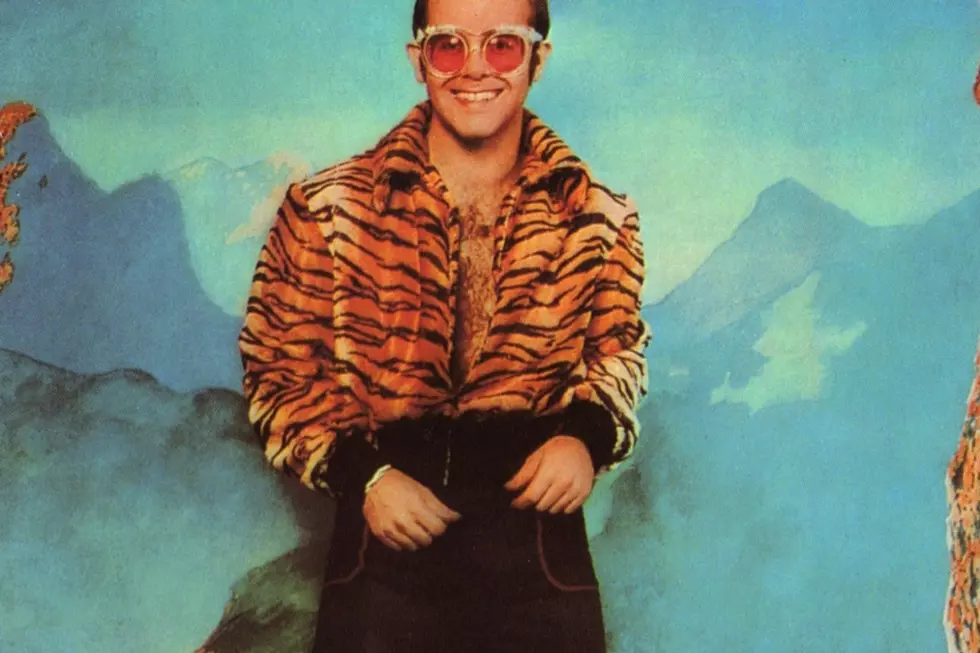
When Red-Hot Elton John Released the Close-to-Classic ‘Caribou’
Can an album be recorded in only nine days? Sure it can. The Beatles needed less than 13 hours in the studio to record their debut LP, and it's a classic.
By contrast, Elton John and his seasoned touring band had a little more than a week to complete all the tracks for the Caribou album. Recorded in January 1974, just before the boys were embarking on a tour of Japan, producer Gus Dudgeon spent some time adding backing vocals and additional instrumentation before the album's release in late June 1974. It quickly shot to No. 1 in both the U.S. and the U.K.
But is it a classic? Hard to say. It's definitely sandwiched between two undisputed masterpieces, Goodbye Yellow Brick Road and Captain Fantastic and the Brown Dirt Cowboy. Compared to those epics – the former a double album full of hits and legendary deep cuts, the latter a song cycle chronicling John and lyricist Bernie Taupin's trip into superstardom – most albums probably wouldn't measure up.
Perhaps "classic" is too strong a word. Let's say instead that Caribou is a really solid effort by John in what's easily his most creatively fertile and successful period.
Listen to Elton John Perfom "The Bitch Is Back"
Two of the tracks from Caribou have gone on to become signature songs. The opening cut, "The Bitch Is Back," is a staple of John's live act and classic rock radio. It's become sonic wallpaper, but give it a closer listen next time it stumbles into view; the Tower of Power horns kill and Davey Johnstone's guitar is still so fresh and so clean.
The other great song, "Don't Let the Sun Go Down on Me," almost didn't make it to the record. The session where John recorded his vocal was difficult because the singer was never satisfied. At one point, according to Philip Norman's Sir Elton: The Definitive Biography, John listened to a playback and remarked, "That's a load of crap. You can send it to Engelbert Humperdinck, and if he doesn't like it, you can give it to Lulu as a demo."
What's magical about "Don't Let the Sun Go Down on Me" isn't just John's vocal; it's what happens around it.
Listen to Elton John Perform "Don't Let the Sun Go Down on Me"
Ray Cooper, who would later tour solo with John and has session and live history with several other British rock luminaries, adds just the right flourishes on tambourine and sleigh bells. The echo of the drums calls to mind Phil Spector's productions. And recognizing the debt some of his songs owed to them, John invited the Beach Boys to participate in the backing vocals; Bruce Johnson and Carl Wilson both add their distinctive voices to the mix. The pieces and parts may seem cheesy on their own; taken together, they're a powerful testament to John and Taupin's songwriting, and the strength of their '70s-era band.
On other Caribou songs, the band continues to take center stage, including John's own keyboard skills. The uptempo rocker "You're So Static" kicks off with a deep funky groove and quickly builds to a frenzied crescendo of distorted guitar, horns, and tambourine -- every instrumentalist firing on all cylinders, goading each other to the limits of their skills. At the center is John's piano, his fingers on a manic sprint up and down the keys. "Pinky" offers a lighter vibe, a mid-tempo ballad punctuated by Cooper on bongos and Dave Hentschel on synthesizer. Johnstone slips in between the lines of the chorus with spot-on acoustic guitar licks.
Some of the songs on Caribou were no doubt quickie castoffs, but each of them has their charms. This is not one of John's towering achievements in pop music. Instead, Caribou represents the simple pleasure of a brilliant rock songwriter and performer working quickly at the top of his game, surrounded by an incredible band. Even if its ambitions are small, it fully realizes those ambitions. Caribou doesn't have to be a classic to be a great listen.
Elton John Albums Ranked
More From Ultimate Classic Rock









